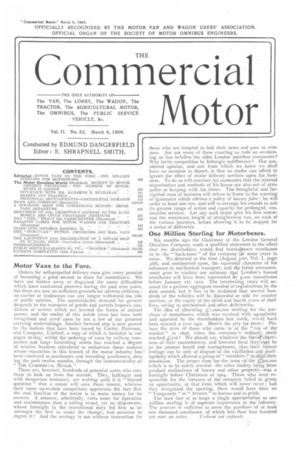Motor Vans to the Fore.
Page 1

If you've noticed an error in this article please click here to report it so we can fix it.
Orders for self-propelled delivery vans give every promise
of becoming a good second to those for motorbuses. We have not hidden away or disguised the many difficulties which have confronted pioneers during the past nine years, but there are now no sufficient grounds for adverse criticism : no carrier or tradesman can any longer withstand the tide of public opinion. The unmistakable demand for greater despatch in the transport of goods and parcels imposes conditions of service which are beyond the limits of animal power, and the reality of this subtle force has been both recognised and acted upon by not a few of our greatest carrying undertakings. Another forward step is now proved by the notices that have been issued by Carter, Paterson, and Company, Limited, a copy of which is included in our pages to-day, whilst the ordering of vans by railway companies and large furnishing stores has reached a -degree of relative freedom calculated to embarrass those makers whose reputation in this branch of the motor industry has been conveyed to purchasers and intending purchasers, dun" ing the past twelve months, through the instrumentality of "THE COMMERCIAL MOTOR."
There are, however, hundreds of potential users who continue to look on from the outside. They, haltingly and with dangerous hesitancy, are waiting until it is " beyond question " that a motor will save them money, whereas their more up-to-date competitors appreciate the fact that the real function of the motor is to make money for its owners. A steamer, admittedly, costs more for operation and maintenance than a sailing vessel, yet no ship-owner, whose foresight in the transitional days led him to be amongst the first to make the change, had occasion to regret it ! And the analogy is not without instruction for those who are tempted to fold their arms and pose as wise men. Are not many of these courting as rude an awakening as has befallen the older London omnibus companies? Why invite competition by lethargic indifference? Our considered opinion, and one from which we know we shall have no occasion to depart, is that no trader can afford to ignore the effect of motor delivery services upon his business. To do so will convince his customers that the internal organisation and methods of his house are also out of sympathy or keeping with the times. The thoughtful and farsighted man of business will refuse to listen to the warning of ignorance which advises a policy of laissez faire: he will order at least one van, and will re-arrange his rounds to suit its greater range of action and capacity for prolonged, consecutive services. Let any such buyer give his first motorvan the maximum length of straightaway run, on each of the various journeys, before allowing it to be stopped for a series of deliveries.
One Million Sterling for Motorbuses.
Six. months ago the Chairman of the London General Omnibus Company made a qualified statement to the effect that the shareholders would find horse.ydifawn omnibuses to be the " back-bone " of the company IFir some years to come. We detected at the time (August, 3rst, Vol. I, page 468), and cornmented upon, the equivocal character of his reference to meolianical transport, and tke latest announcement goes-'to 'confirm our estimate tb.at London's horsed omnibuses will have been sunerseded:by 5,000 'motorbuses before January ist, Toro. The intervening years will account for a greater aggregate number of registrations by the date named, but it has to be reckoned that several -hundreds of the vehicles will be discarded or sold for country services, at the expiry of the third and fourth years of their lives, owing to mechanical and other deficiencies_ The idea of allocating .,4:1,00o,000 sterling for the purchase • of motorbuses, which was received with equanimity and approval by the shareholders last week, • IN'ould have been scorned a year ago. More's the pity for them ! Picture the state of those who came in at the " top of the market" in 1898, when the company's • ordinary stock reached £216! We should say, whatever the -forc4chgeriness of their countenances, and however loyal theyinlay be to the present board rind management,. that their inmost feelings can be only of disgust at the vacillation and pusillainiMity which allowed a grourrof "outsiders "' to,st'qattheir passession. The proper time for the issue of the ;!,.',5oo,000 which is to be newly created—the other moiety • being from gradual realisations of horses and other property—Was a fortnight before Christmas of locm.. Those who were responsible for the fortunes of the company failed to grasp an opportunity, at that time, which will never recur ; had they recognised the opening, there would have been no " Vanguards " or" Arrows " to harass and to prick.
The bare fact of so large a single appropriation as one million sterling is of supreme importance to the industry. The amount is sufficient to cover the purchase of at least one thousand omnibuses, of which less than four hundred are now on order. Ferbzlin sat sapienti.




















